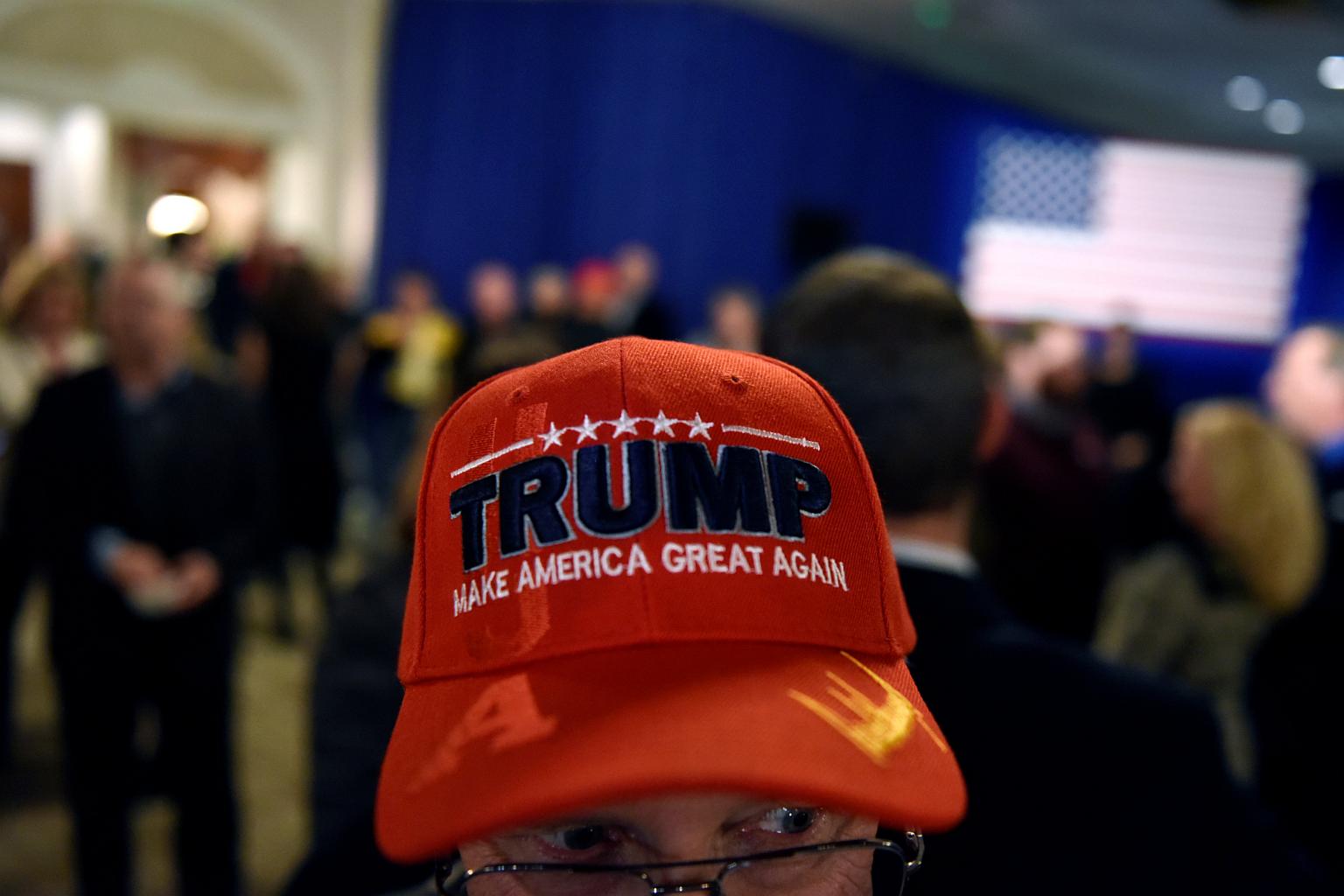Republicans clinch control of US Senate with decisive wins
Sign up now: Get ST's newsletters delivered to your inbox

A supporter wearing a Donald Trump hat at a midterm election party in Wisconsin on Nov 6, 2018. The Republicans gained in two states that overwhelmingly supported Mr Trump in 2016.
PHOTO: REUTERS
WASHINGTON (BLOOMBERG) - Republicans kept control of the Senate, empowering President Donald Trump to appoint more conservative federal judges and agency officials while shielding him from Senate Democratic efforts to investigate his administration.
The GOP's gains in two states that overwhelmingly supported Mr Trump in 2016, along with Republican's retention of a hotly contested seats in Texas and Tennessee, would leave Democrats four votes shy of the 51 they need to take Senate control.
Democrats lack enough opportunities to make up for their losses, with only seats in Nevada and Arizona offering the party a chance.
Democrats were on track to gain control of the US House. That would threaten to shift the policy agenda in Washington toward stalemate after two years of unified GOP control of Congress and the White House, which yielded a massive US$1.5 trillion (S$2.06 trillion) tax cut and a rollback of financial and environmental regulations.
Republican Senate control is critical to Mr Trump amid Special Counsel Robert Mueller's investigation of Russian election-meddling in 2016 and possible obstruction of justice.
Mr Trump is widely expected to fire Attorney-General Jeff Sessions, who recused himself from overseeing the probe. If the President does, he'll need Senate confirmation of a new nominee who could take control of the matter from Deputy Attorney-General Rod Rosenstein, viewed as Mr Mueller's strongest protector.
Republicans are benefiting from a lopsided election-year map in which Democrats have had to defend nearly three times as many seats as the GOP. The GOP's current majority is 51-49.
Republicans won an early victory in Indiana, where Democratic Senator Joe Donnelly was defeated by Republican challenger Mike Braun, according to network projections. And in North Dakota, Democratic Senator Heidi Heitkamp's bid for a second term fell short, with GOP Representative Kevin Cramer besting her in a state that, like Indiana, heavily favoured Trump in his 2016 White House bid.
In Tennessee, a state carried by Mr Trump in 2016, Republicans retained the seat of retiring GOP Senator Bob Corker. There, Republican Representative Marsha Blackburn defeated Democrat Phil Bredesen, a popular former governor of the state. In Texas, GOP Senator Ted Cruz defeated Democratic Representative Beto O'Rourke.
Democrats aren't without some bright spots after a day of record-high turnout in many states. In West Virginia, incumbent Democratic Senator Joe Manchin is the projected winner in his heated race against Republican Patrick Morrisey.
Democratic Senator Bill Nelson of Florida is virtually tied with his Republican challenger, Governor Rick Scott with 98 per cent of precincts reporting.
When the next session of Congress begins in January, Republicans' hold on power will still require them to work with Democrats to pass legislation. They will lack the 60 votes needed to advance bills over Democratic opposition.
Before the election, Senate Majority Leader Mitch McConnell said little about his priorities for 2019 beyond plans to ratify Mr Trump's new trade deal with Canada and Mexico.
There has been bipartisan work in both chambers on a measure overhauling criminal sentencing. Another area of common interest is funding for roads and bridges.
Mr McConnell has said he'd like to try again to repeal Obamacare if he has the chance. He said in an interview with Bloomberg News that the GOP goal of trimming federal spending by cutting Social Security, Medicare or Medicaid would be almost impossible to achieve without GOP control of both chambers of Congress.
Likewise, the debate over immigration law changes could remain as divisive as ever.
Senate Republicans will have their strongest leverage over confirmations. Rule changes in the past five years have cut the number of votes needed to advance executive and judicial nominations from 60 votes to just 51.
Mr McConnell can continue his drive to reshape the federal judiciary by working with the White House to confirm more conservative nominees. In the last two years, the GOP-led Senate has confirmed 69 federal judges, including Supreme Court Justices Brett Kavanaugh and Neil Gorsuch, 26 appellate court judges, and 41 district court judges.
The Republican Senate will be favourable for Mr Trump if he seeks to replace Cabinet officials in addition to Mr Sessions. The president has expressed dissatisfaction with the work of Homeland Security Secretary Kirstjen Nielsen as migrants continue to spill across the US-Mexico border.
Republicans also will keep control of the agenda and oversight work of all the Senate's committees. Had Democrats prevailed, they would have gained the ability to subpoena Mr Trump and the administration and call top officials to testify.
Mr McConnell retains the ability to decide what is debated on the Senate floor and when - a powerful lever ahead of the 2020 presidential and Senate elections. Still, Democrats are well-situated to try to snag the Senate majority in 2020, when 22 GOP-held seats will be up for re-election compared with just 12 for Democrats.


